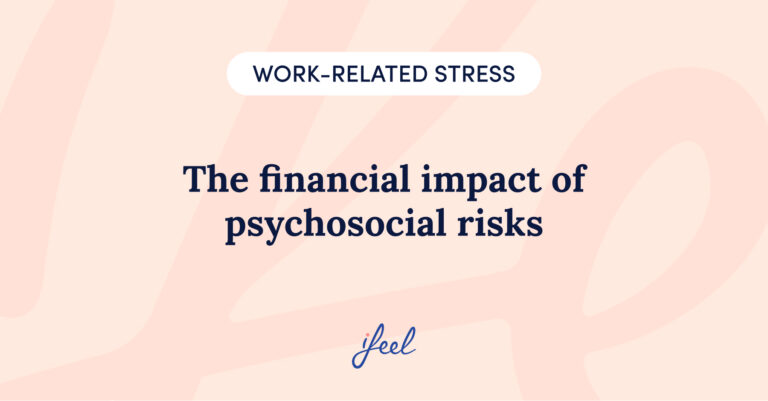Mental well-being in senior management is a critical issue, yet one that is still surrounded by prejudice and significant stigma. In a context where expectations and pressures on leaders are immense, addressing and demystifying the myths surrounding mental health in these senior roles is essential.
But then, what can leaders do for their mental health at work? In this article, we will explore the causes of stigma, the consequences of mental health neglect in senior management and how companies can foster a culture of support and care for their leaders.
In addition, we encourage you to download our resource on how to care for leaders’ mental health, which will provide your leadership team with essential tools for their well-being. Prioritise mental health in your company and ensure stronger and more resilient leadership here.
So, what can leaders do for their mental health at work?
The mental health stigma in senior management
The stigma associated with mental health is a significant challenge at all levels, but it takes on a special gravity in senior management positions.
The reason is that business leaders are often perceived as ‘superhuman’ individuals, capable of handling any situation without showing vulnerability. This perspective can be detrimental and cause managers to hide their mental health problems for fear of being seen as weak or incompetent.
Causes and consequences
Multiple causes can lead to the question: what can leaders do for their mental health at work? The answer may vary, as the causes may differ depending on the individual manager. However, the main causes of the stigma faced by leaders include:
- High expectations: Society and organisations expect people in leadership roles to be flawless. This expectation creates additional pressure that can exacerbate existing mental health problems.
- Culture of excessive work: In many cases, working longer hours is assumed to be synonymous with greater success. For leaders, this can mean constant burnout and reduced time for leisure and self-care.
- Leadership loneliness: Self-demand and perfectionism, coupled with the false belief that ‘they should be able to handle it all’, can lead to leaders not asking for help, increasing feelings of loneliness and hopelessness.
Impact of neglecting mental health in senior management
When boarding an aircraft, we have all heard the safety instructions given by the cabin crew before take-off. The most important instruction is usually:
‘Make sure you put on your oxygen mask yourself before helping the other passengers’.
This case perfectly exemplifies the importance of prioritising self-care over the care of others. Basically, because having enough oxygen improves your ability to help others afterwards.
The same goes for mental health. When leading a team or an organisation, a person with high levels of general well-being will be better able to guide and support others in their professional development. However, this is not always the case: in many cases, leaders sacrifice their mental well-being to ensure companies thrive, putting others before themselves.
The impact of mental health neglect on leadership roles is profound and multifaceted. According to research, 72% of leaders in large companies have experienced mental health problems due to stress, and 63% of themreport suffering from burnout.
These figures underline the urgent need to develop strategies for addressing mental well-being in senior management. But what can leaders do for their mental health at work?
According to ifeel’s internal data, 96% of managers consider the inclusion of mental well-being solutions in companies to be important; and 88% of them consider the information received in workshops on mental health to apply to their daily lives.
| Effects on the Company | Description |
|---|---|
| Reduced productivity | A leader who is not in their best mental state cannot perform at their highest capacity, impacting the productivity of the entire team. |
| A leader who is not in their best mental state cannot perform at their highest capacity, impacting the entire team’s productivity. | Untreated mental health issues can lead to higher turnover in leadership positions. According to statistics, in 2023, there was a 50% increase in resignations in these roles due to mental health issues. |
| Inefficient decision-making | Deteriorating mental health can impair decision-making abilities, which can have negative consequences on the company’s strategy and operations. |
What can leaders do for their mental health at work?
Companies need to integrate practices and policies that proactively promote mental well-being to tackle stigma and support leaders’ mental health.
That’s why we encourage you to download our resource on how to take care of leaders’ mental health. You will learn all about how stress affects leaders, so you can provide your management team with essential tools for their well-being.
In addition, here are some strategies that can help leaders take care of their mental health at work:
Prioritise self-care:
Leaders should be encouraged to get adequate rest, exercise, maintain a balanced diet and practice relaxation techniques.
On this, Gabriele Murrone, Co-founder and CPO of ifeel, emphasises the importance of focusing on goals with greater impact and learning to say no to protect mental health.
1. Set clear boundaries:
Leaders must learn to draw the line between work and personal life, which includes switching off outside of work hours and prioritising tasks according to their importance.
2. Encourage open communication:
Creating an environment where conversation about these issues is encouraged can help create spaces of openness about mental health.
Martin Villanueva, Co-founder and COO of ifeel, says that mental health is the foundation for bonding and improved self-esteem.
3. Seek professional support:
Implementing mental wellness solutions that offer professional psychological support, can facilitate access to support resources when needed.
Beatriz Julian Almarcegui, Head of People at ifeel, stresses the importance of self-awareness and prevention through activities that promote calm and self-connection.

Practical exercise: Well-being Diary
A practical exercise for leaders that can help them assess and improve their well-being is keeping a ‘Well-being Diary.’ This exercise facilitates daily reflection and the identification of patterns that affect their mental health.
To do this, follow the instructions below.
- Get a notebook or journal: Dedicate a notebook specifically for this purpose.
- Establish a daily routine: Write in your journal for at least 10-15 minutes at the end of each day.
- Record your activities and emotions:
- Activities: Write down the main activities you did during the day.
- Emotions: Describe how you felt throughout the day – were there moments of stress, joy, frustration, or calm?
- Interactions: Reflect on your interactions with colleagues, family, and friends – were they positive or negative?
- Reflect on well-being:
- Which activities gave you energy, and which took energy away?
- How did your emotions affect your performance and well-being?
- What situations caused you the most stress, and what helped you manage them?
- Identify Patterns and Actions:
- Review your daily entries at the end of each week to identify patterns in your emotions and activities.
- Ask yourself: How can I increase the activities that energise me and reduce those that deplete me?
- Set small goals for the next week that will help you improve your overall well-being.
This exercise can clearly show the areas that need more attention and care, promoting a more holistic and balanced approach to mental health.

Trust the experts
At ifeel, we know that demystifying the stigma of mental health in senior management is a crucial task for the sustained success of any organisation. By implementing proactive strategies and fostering a supportive culture, companies can ensure that their leaders not only thrive in their roles, but also maintain a high level of mental wellbeing. Ultimately, asking what leaders can do for their mental health at work can lead to a mentally healthy leadership style.
To assist in this process, our team of psychologists specialising in mental well-being has developed a mental well-being program for companies aimed at helping companies enhance employee engagement and boost productivity.
This collaboration allows HR managers to receive personalised, data-based advice on the most effective measures for detecting employee mental health issues and assessing the workplace climate. It’s the best way to understand their needs.
Moreover, ifeel’s corporate mental well-being solution offers employees a structured mental health care service tailored to their needs at any given time.
We hope you found this article on ‘what can leaders do for their mental health at work’ interesting. If you want more information about our mental well-being solution for companies, simply request it, and we will contact your team soon.







